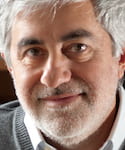Rice professor wins Award in Theoretical Chemistry for career of breakthroughs
Gustavo Scuseria, the Robert A. Welch Professor of Chemistry and a professor of physics and astronomy and of materials science and nanoengineering at Rice University, is the winner of the 2022 American Chemical Society (ACS) Award in Theoretical Chemistry.
Scuseria was honored “for his contributions in the areas of coupled cluster and density functional theories, and linear scaling electronic structure algorithms,” according to the society.
“There are several national ACS awards that are the most prestigious, but this is the only one for theory,” Scuseria said. “That makes it special for me.”
The award honors achievements by Scuseria, who joined Rice in 1989, that straddle quantum chemistry, condensed matter physics and materials science with an eye toward energy and environmental applications.
“It’s about things I’ve done in the past, but about 10 years ago, my group completely changed direction and we started working on something called strong correlation,” he said.
“The difference between weak and strong correlation is technical, but has to do with the entanglement of electrons, spooky action between things that are far away from each other but still know what the other is doing,” Scuseria explained.
“Computational quantum chemistry has been very successful, but the best existing methods only work on the top rows of the periodic table,” he said. “Once you get into the lower rows, and you have metal and heavy atoms with many electrons, the models don’t work as well or don’t work at all.
“That’s the problem we’re working on, and it has to do with how molecular magnets or enzymes that have multiple metal atoms do nifty things at room temperature,” Scuseria said. “That applies to chemical reactions like nitrogen fixation that we see in plants and even our own bodies.
“Industrially, we spend an awful lot of energy making fertilizer — for example, ammonia — but there are enzymes that do this very efficiently,” he said. “Nature has found a way to do this cheaply at room temperature, but the tools of quantum chemistry are not good enough to provide accurate modeling, and the mechanisms are very complicated. If we can synthesize a nanoparticle that does the same thing, we think we can save 3% of the world’s energy.”
Scuseria said he looks forward to applying his group’s ideas to research by the Rice Quantum Initiative and The Welch Institute, though he hasn’t completely left his earlier work behind, contributing a recent commentary to the Proceedings of the National Academy of Sciences on advances in solid-state band gap predictions.
It joins his nearly 500 publications. Scuseria has also presented more than 400 invited lectures at conferences and research institutions internationally. He is a highly cited researcher, with nine of his papers receiving more than 2,000 citations each.
He is currently co-editor of the Journal of Chemical Theory and Computation published by ACS and a fellow of the American Chemical Society, American Physical Society, American Association for the Advancement of Science, Guggenheim Foundation and Royal Society of Chemistry.
The award will be presented at the ACS Spring Meeting and Expo, planned for March in San Diego.


